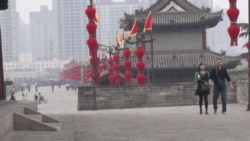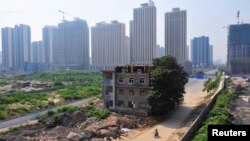China's historic city of Xi'an has been the capital for 13 imperial dynasties. But today, much like every other modern Chinese metropolis, it is competing for opportunities amid a general economic slowdown with a host of other cities.
But in Xi'an's case, some worry it may be trying to do too much too fast.
The city wants to become China’s Silicon Valley and has set up a high-tech development zone to attract foreign and domestic companies.
Attracting major investments from Korean company Samsung is seen as one of the city’s big successes. Samsung has opened an electric car battery factory, which began production late last year, and aims to reach annual sales of up to $1 billion a year by 2020.
Samsung has said that together with China’s “One Belt, One Road” initiative, an ambitious plan to expand land and sea trade routes, it wants to help make Xi’an the electric vehicle battery center of the world.
Samsung also has invested heavily in a chip factory in Xi’an, but plans to expand the facility have been put on hold.
Building boom
Standing on Xi’an’s city wall, one can see the huge potential and challenges the city faces.
All around busy cranes dot the skyline, while below shops sit empty with "For Rent" signs on their windows. At a time when many are debating whether the Chinese economy will slip into a recession or have a hard landing, Xi’an’s building space increased by more than 60 percent in the first quarter.
But huge empty buildings are not difficult to find in the city. In some cases, they sit for years, unused, until they are torn down to make way for new ones.
Last year, Xi’an set a record by using 1.4 tons of explosives to take down a 118-meter building in 13 seconds.
Wang Ye, an economist at Xi’an Jiaotong University says what is lacking is a grand strategy and a new model for development. Since the early 1990s, China has relied heavily on building.
“Building buildings is an easy way to show results,” he said. “But you can’t rely on that model forever and we’ve really reached a bottleneck.”
“The satellite city model is much better, Wang added. "Where you have a city center and then loads of space in between for the environment and forests. What we have here is the explosive model.”
Malls galore
Amid the economic slowdown, massive shopping malls continue to go up. Some bustling with activity, some empty since completion more than two years ago.
China has long relied on exports to boost its economy, but is now looking to bolster the buying and selling of goods domestically by building more malls, but the growth in shopping centers cuts both ways.
Zhang, who sells T-shirts at Kangfu Road Market, once the launchpad of many would be entrepreneurs, said there is really no way to compete with the newer facilities.
“In addition to wide selection of goods at reasonable prices, they also have restaurants and entertainment,” he said. “How can I compete?”
E-commerce explosion
And many are younger and more savvy at e-commerce, Zhang said. And when you add the slowing economy on top of that, Zhang said he is struggling to stay afloat.
Mo Shuo, who has been selling shoes at Kangfu Road Market for nearly two decades, said with the slowdown his sales have been cut in half. He too says the explosive expansion of online stores is also having an impact.
“It used to be that people would come out and shop,” he said. “Now they are buying it online and staying at home.”
Mo said while he wants to go online too, it’s not that simple because if he did, it would mean having to increase his business operating costs.
Not far from Mo’s store, another brand new shopping center sits empty.
Similarly, at Wenyi Road Silk Market a new facility is just steps away, but sits empty. Wenyi Road Silk Market has long been a mainstay in this city that was once a departure point for the ancient Silk Road.
During a recent visit, the market was bustling with activity, but not overly crowded. Filling the air, the sound of buyers bantering with shop owners and the occasional sound of ripping silk after it has been purchased and measured. Near the entrance, seamstresses were lined up against the wall into a makeshift outdoor production line as their sewing machines buzzed away.
But even here, there are signs of a slowdown.
One seamstress who was sewing together a bed sheet said, "usually we help out other stores when we can, but this year business has been slower." The one upside, she adds, is that she doesn’t have to work overtime as much.






